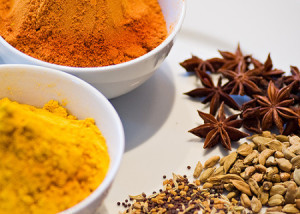Curcumin: A Spice for Better Mental Health
 Everyone needs a little spice in their life! Most people when they hear the word spice first think about taste. Whether it is pepper, salt, chili powder or cinnamon, spices provide that add punch of favor to our food that we can’t resist. But a new study from Australia suggests the curcumin may also be a potential treatment for depression and mood disorders. Scientist report this month (Oct 2014) that in 56 people with a history of major depression 500 mg of curcumin twice a day after 8 weeks resulted in a significantly greater antidepressant effect than the the effect of a placebo pill.
Everyone needs a little spice in their life! Most people when they hear the word spice first think about taste. Whether it is pepper, salt, chili powder or cinnamon, spices provide that add punch of favor to our food that we can’t resist. But a new study from Australia suggests the curcumin may also be a potential treatment for depression and mood disorders. Scientist report this month (Oct 2014) that in 56 people with a history of major depression 500 mg of curcumin twice a day after 8 weeks resulted in a significantly greater antidepressant effect than the the effect of a placebo pill.
This could be a very important break through not only for the potential mood benefits noted by this study be also the potential healthcare cost savings. According to the NY Times and the National Institutes of Mental Health use of antidepressants has skyrocketed in the US with about 1 in 10 Americans using antidepressant medication and among women in their 40s and 50s, the figure is 1 in 4. From data published in 2008 approximated 254 million prescriptions were written annually for antidepressant resulting in nearly $10 billion in costs. This figure is much higher now and continues to grow.
Could there be a better alternative? Health Benefits of Curcumin
For over 5,000 years the people of Southeast Asia have enjoyed the wonderfully favored spice turmeric in their food. Turmeric is derived from the plant Curcuma longa whose root-like rhizomes are ground into the brightly colored yellow spice we all know. For all these thousands of years turmeric has transformed Indian and other Southeast Asian foods into some of the most popular ethnic foods in the world. Curcumin has powerful antioxidant and anti-inflammatory properties and is the main active component of turmeric spice. Recent research on the health benefits of curcumin has launched it into superstar status as a nutritional supplement for health, longevity and now benefits for mood and mental health.
Turmeric, used both in food and as a supplement, has been used for many centuries for arthritis, headaches, infections, fever, liver problems, heartburn and other stomach disorders, to name but a few of its uses. Turmeric research has also been done with cancer, brain degeneration, heart disease and most other chronic and age-related diseases. But it wasn’t until about the 1900’s that scientists learn the secret ingredient in turmeric. Although turmeric contains hundreds different healthy molecules, it was discovered that the curcumin is by far the most powerful to molecule in turmeric to improve human health. In fact only 2-5% of turmeric is curcumin. Science has now been able to concentrate curcumin as a powerful food/dietary supplement.
Today’s research studies and dietary supplements use concentrated curcumin which is typically about 70 – 80% pure. Curcumin naturally repeals water and is this makes it harder for our intestinal tract to absorb it. Manufacturer and suppliers of concentrated curcumin supplements have realized this and have introduced new and inventive methods to improve the absorbability to obtain all the benefits of curcumin. Research into the health benefits of curcumin is extensive with over 6,800 scientific articles being published since 1990. The pace of these discoveries has exploded with almost 1,000 new articles being published in 2013 alone. We now know that the health benefits and actions once associated with turmeric were actually due to curcumin it contained. Curcumin has been shown to be a powerful antioxidant, can block unwanted inflammation and fight infections. Curcumin has shown anticancer actions and can help those with diabetes, arthritis, Alzheimer’s disease and other chronic illnesses.
The mechanisms for curcumin in mental health are complex but recent research shows that in addition to disturbances in serotonin availability, major depression also is associated with biological disturbances of brain metabolism. These include hormone changes, activation of immune inflammatory pathways and increased oxidative stress. Curcumin has been shown to modulate the activity of several key cellular factors that have the ability to turn on DNA production of health promoting proteins in every cell of our body. By doing so curcumin can alter the production of inflammatory molecules called cytokines and kinases, and increase anti-oxidant protections.
Curcumin exhibits a wide range of activities:
- Antibacterial
- Anti-inflammatory
- Lower cholesterol
- Protect the Liver
- Block inflammatory Enzymes LOX and COX
- Active Antioxidant
- Reduce lipid breakdown into free radical toxins
- Reduces platelet aggregation and blood clots
- Inhibit Cancer cells growth and spread
- Improve digestion and gallbladder function
- Inhibit blood vessel thickening
- Help mood and neurodegeneration
Reference: Curcumin for the treatment of major depression: A randomised, double-blind, placebo controlled study,” Journal of Affective Disorders Volume 167, Pages 368–375, October 1, 2014 DOI: 10.1016/j.jad.2014.06.001




 Dr. Maroon received an athletic scholarship to Indiana University in Bloomington, Indiana where as an undergraduate, he was named a Scholastic All-American in football. Dr. Maroon has successfully maintained his personal athletic interests through participation in 9 marathons and more than 72 Olympic-distance triathlon events. However, his greatest athletic accomplishment is his participation in 8 Ironman triathlons (Hawaii – 1993, 2003, 2008, 2010, 2013; Canada – 1995; New Zealand – 1997; Germany – 2000), where he usually finishes in the top 10 of his age group. Recently, in July 2012 and 2013, he finished second and third, respectively, in his age group in the Muncie, Indiana half Ironman triathlon. In October 2013 he completed his 5th World Championship Ironman in Kona, Hawaii.
Dr. Maroon received an athletic scholarship to Indiana University in Bloomington, Indiana where as an undergraduate, he was named a Scholastic All-American in football. Dr. Maroon has successfully maintained his personal athletic interests through participation in 9 marathons and more than 72 Olympic-distance triathlon events. However, his greatest athletic accomplishment is his participation in 8 Ironman triathlons (Hawaii – 1993, 2003, 2008, 2010, 2013; Canada – 1995; New Zealand – 1997; Germany – 2000), where he usually finishes in the top 10 of his age group. Recently, in July 2012 and 2013, he finished second and third, respectively, in his age group in the Muncie, Indiana half Ironman triathlon. In October 2013 he completed his 5th World Championship Ironman in Kona, Hawaii.